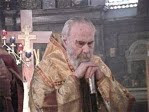On this second Sunday of Lent we celebrate Saint Gregory Palamas who was a defender of a principle mystical teaching of Orthodoxy that we can experience God's Divine Energies even though we can never know His essence. He explained that when the Apostles witnessed the Transfiguration of Jesus Christ on Mount Tabor, that they were seeing the actual uncreated light of God. This was not some created experience. He also taught that it is possible for others to be blessed to see that same uncreated light of God by repentance, spiritual discipline and the practice of the Jesus Prayer. Saint Gregory cautions those of a rational mind to be open to the incredible mystery that is available to those who are pure of heart.
"There are people in our own times...who completely disobey spiritual men in matters of the Spirit, and choose to oppose them. When they hear that the light of the Lord's transfiguration on the mountain was seen by the eyes of the apostles, they immediately reduce it to visible, created light. They drag down that immaterial, never-setting, pre-eternal light, which surpasses not only our senses but also our minds, because they themselves are at a low level, and are incapable of conceiving of anything higher than earthly things. Nevertheless, He who shone with this light proved in advance that it was uncreated by referring to it as the kingdom of God. God's kingdom is not subservient or created, but uniquely unsubduable and invincible. It is beyond the bounds of both time and aeon, and cannot be said to have had a beginning or to have been overtaken by time or age. We believe this kingdom to be the inheritance of those who are being saved.
Given that when He was transfigured the Lord shone and displayed glory, splendor and light, and will come again as He was seen by His disciples on the mountain, does this mean He somehow took this light to Himself, and will have for ever something He did not have before? Perish the blasphemous thought! ...He possessed the splendor of the divine nature hidden under His flesh. This light, then, is the light of the Godhead, and it is uncreated. According to the theologians, when Christ was transfigured He neither received anything different, nor was changed into anything different, but was revealed to His disciples as He was, opening their eyes and giving sight to the blind. Take note that eyes with natural vision are blind to that light. It is invisible, and those who behold it do so not simply with their bodily eyes, but with eyes transformed by the power of the Holy Spirit." (Homily 34)This uncreated light seen by the Apostles is clearly not physical. Saint Gregory says it is available to all of us. But He cautions that we can never assume to know the essence of God. This is unknowable to us. We should pursue our own purification to experience the wonder of His uncreated light as this only comes to those who are pure of heart as were Peter John and James, the only ones He took with Him to Mount Tabor. This is why we are reminded of His teaching at this time in our fast. Our fast is to help us build the self-disciplne to enable to attack our sinfulness so we too can become pure in heart and be one with god and bask in His uncreated light.
Thus is this light measured out and distributed, while remaining entire, and is received more by some, less by others. It is known partly now, partly later, so Paul says, "We know in part, and we prophesy in part" (I Cor. 13:9). By contrast, God's essence is absolutely indivisible and incomprehensible, and no other being can receive it, either to a greater or lesser extent. Only the accursed Messalians think otherwise, supposing that God's essence can be seen by those among them who are worthy We, however, turn aside from heretics of earlier ages and our own and believe, as we were taught that the divine kingdom, glory, splendor, ineffable light, and divine grace can be seen and shared by the saints, but not God's essence. So let us make our way towards the radiance of the light of grace, that we may acknowledge and venerate the threefold Godhead, who shines with a single indescribable radiance from one nature in three persons. Let us lift up the eyes of our understanding to the Word who now sits, with His body, above the vaults of heaven. And He who sits in divine splendor on the right hand of majesty, utters these words to us as if from afar, "If anyone wants to stand in the presence of this glory, let him imitate Me as far as he can, and follow the way and the manner of life I taught on earth".
Let us look with our inner eyes at this great spectacle, our nature, which dwells for all eternity with the immaterial fire of the divinity. And let us take off the coats of skins (cf Gen. 3:21), the earthy and carnal ways of thinking, in which we were clothed because of our transgression, and stand on holy ground (cf Exod. 3:5), each one of us hallowing our own ground by means of virtue and reaching up to God. In this way we shall have boldness when God comes in light, and as we run to Him we shall be enlightened, and, once illumined, shall live for ever to the glory of the one brightness in three Suns, now and for ever and unto the ages of ages. Amen. (Homily 35)Keep up the fast, double your prayers, participate in the additional services, and help those in need during this Lenten period.
Read both the Homilies by Saint Gregory: Homily 34 & Homily 35


.jpg)








